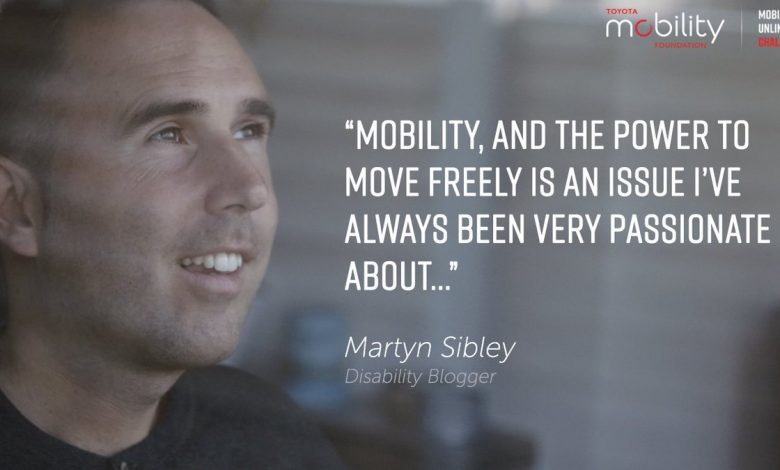
What is the future of mobility?
Disability Horizons Co Founder Martyn Sibley has been showcasing his presenting talents again. This time on a very interesting project with the Toyota Mobility Foundation. Fronting their 3 part mini documentary series, he explores the future of mobility. He’ll show that by helping design your own mobility device, you could have a chance to win some of the $4m available in this exciting new challenge.
Mobility and the power to move freely has always been important to me. So naturally, I was excited to hear all about how The Toyota Mobility Foundation, a charity with a focus on mobility, have launched a $4m campaign to create the future of mobility products. The aim of this project is to spur innovation that supports social good. Achieved by us, the disabled community, helping to create a device that gives people their everyday mobility.
In the first episode Julie Ann, the marketing manager of Toyota Mobility Foundation, explained about the market failure for products and services available for wheelchair users. She told me that the project hugely believes in the human-centred design process by allowing the end user to get involved.
The Toyota Mobility Foundation then brought Nesta in as partners for their expertise in designing and delivering challenges. The 5 finalists of this challenge will each receive a half million-dollar grant to help develop their ideas.
The winner will then receive $1 million.
Through supporting innovations that incorporate intelligent systems, The Toyota Mobility Foundation hope to change mobility forever.
In the second episode I spoke to members of our community. Christian, my disabled friend in Barcelona told me the wheelchair of the future needs to be ‘cool’ in order to attract and help young disabled people. DHorizons regular Mik Scarlet reminds us how important it is to include disabled people when designing new wheelchairs, and that designers need to think bigger than their own experience.
Kamran Malik, the CEO of Disability Rights UK, tells us how young people are expecting technology to be part of their mobility equipment that they use (which may not necessarily be a wheelchair). It’s clear there’s incredible scope for development in mobility, from improving the aesthetics, to creating modular solutions.
In the third and last episode I speak about innovation with the Global Disability Innovation (GDI) Hub . They are creating a movement to accelerate innovation for disabled people. Cathy, who is the academic director of the GDI Hub (as well as being a senior lecturer at University College London) tells us how a range of voices are needed for this project.
Cathy reckons that artificial intelligence will get smarter and more useful. She hopes this challenge will bring a device that isn’t necessarily a wheelchair, but something that really fits the users’ whole lifestyle. The issue here really is about mobility, not a wheelchair.
Finally we talked about intelligent systems, which design for the end users, and looks at the whole infrastructure within which the system is going to be placed. Intelligent systems also harness things such as big data and artificial intelligence in order to make the system smarter than traditional methods. An example Cathy gave me was if I were to put sensors on my wheelchair, I could make a ‘local map’, so my wheelchair could drive for me.
The winning team will decide the future of assistive mobility devices. They may even come up with something that hasn’t even yet been invented. These are exciting times for all things mobility!
To enter or to find out more information, please head to www.
By Martyn Sibley
More on Disability Horizons…
- 4 healthcare tech advances expected to significantly impact in 2018
- A future of limitless opportunities
- Assistive technology: 5 of the coolest gadgets
Get in touch by messaging us on Facebook, tweeting us @DHorizons, emailing us at editor@disabilityhorizons.com or leaving your comments below.